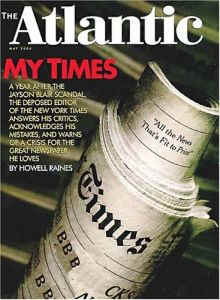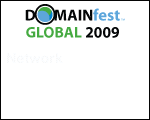|
Having
grown up in an era dominated by traditional media
I am intrigued by what journalism will look like when
the newspapers are gone and reporting completes its
inevitable move to the Internet. I personally
made the move six years ago this month when DN
Journal went online and I'm surprised by how many
outlets still have not embraced the obvious
advantages of publishing on the web. Today most
traditional media outlets, especially newspapers, are
hanging off the side of a cliff by their fingernails,
dying by a thousand daily cuts.
|
The
new issue of The Atlantic Magazine
has the best article I've read to date about the
passing away of old media and what the new media
world is going to look like. The piece, titled End
Times, by Michael Hirschorn,
details the near death predicament the New
York Times finds itself in and in an
enlightening passage at the end of the article,
predicts what journalism will morph into in the
very near future. Regarding
the Times, Hirschorn noted, "With
more than $1 billion in debt already on
the books, only $46 million in cash
reserves as of October, and no clear way to tap
into the capital markets (the company’s debt
was recently reduced to junk status), the
paper’s future doesn’t look good...
Regardless of what happens over the next few
months, The Times is destined for
significant and |

|
|
traumatic change.
At some point soon — sooner than most of us
think — the print edition, and with it The
Times as we know it, will no longer
exist." Hirschorn said the end could
come this year, even as early as May
when The Times has $400 million in
debt coming due. |
|
|

|
So what will the
reporting profession look like when the
"newspaper of record" is gone (along
with dozens of others also facing the
guillotine)? Hirschorn wrote, "...journalistic
outlets will discover that the Web allows (okay,
forces) them to concentrate on developing
expertise in a narrower set of issues and
interests, while helping journalists from other
places and publications find new audiences."
"In this
scenario, NYTmes.com would begin to
resemble a bigger, better, and less partisan
version of the
Huffington Post, which, until |
|
someone smarter or
more deep-pocketed comes along, is the
prototype for the future of journalism: a
healthy dose of aggregation, a wide range of
contributors, and a growing offering of original
reporting. This combination has allowed the
HuffPo to digest the news that matters most to
its readers at minimal cost, while it
focuses resources in the highest-impact areas.
What the HuffPo does not have, at least not yet,
is a roster of contributors who can set agendas,
conduct in-depth investigations, or break
high-level news. But the post-print Times
still would." |
|
|
|
I found Hirschorn's
closing comments to be especially compelling as
I see things playing out in the same way he
does, particularly his vision of the top writers
emerging stronger than ever in the web
based media world.
Hirschorn opined,
"The best journalists will survive,
and eventually thrive. Some will be snapped up
by an expanding HuffPo (which is raising
millions while its print competitors tank)
and by the inevitable competitors that will
spring up to imitate its business model, or even
by smaller outlets, like Talking
Points Memo, which have found that
keeping their overhead low allows them to profit
from high-quality journalism. And some will
succeed as independent operators. Figures
like Thomas Friedman, Paul Krugman
and Andrew Ross |

|
|
Sorkin (the
editor of the DealBook
business blog, which has been a cash
cow for The Times) would be worth
a great deal on the open market. For them and
others, the bracing experience of becoming “brands
of one” could prove intoxicating, and
perhaps more profitable than fighting as
part of a union for an extra percentage-point
raise in their next contract." |
"Ultimately, the death
of The New York Times — or at least its print
edition — would be a sentimental moment, and a severe
blow to American journalism. But a disaster? In the long
run, maybe not," Hirschorn concluded.
|














